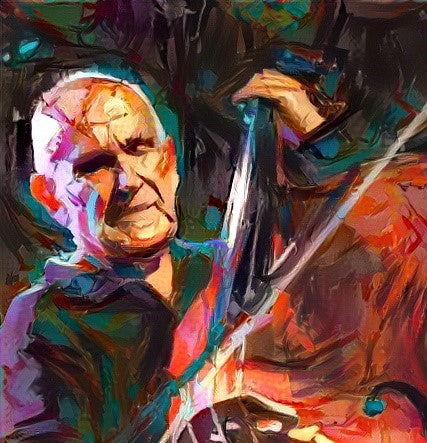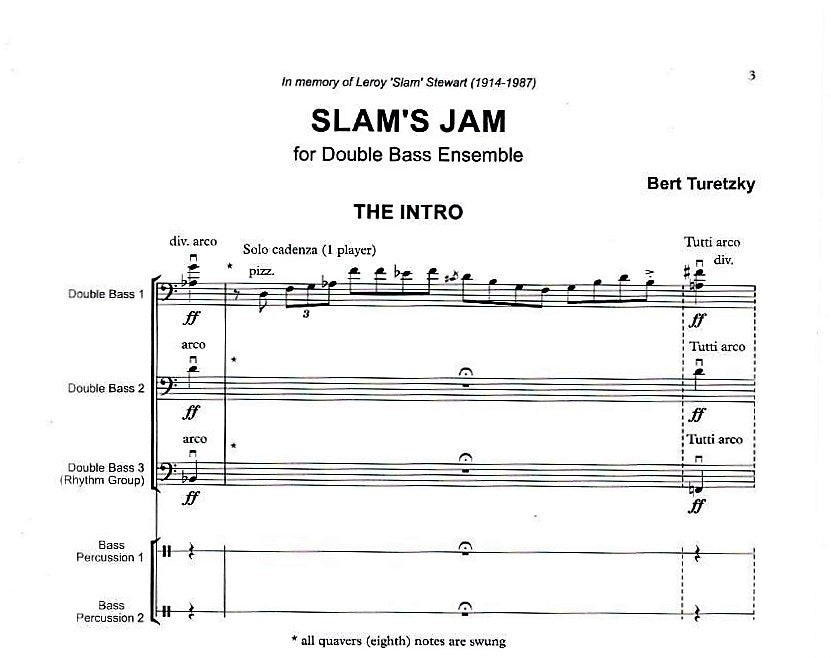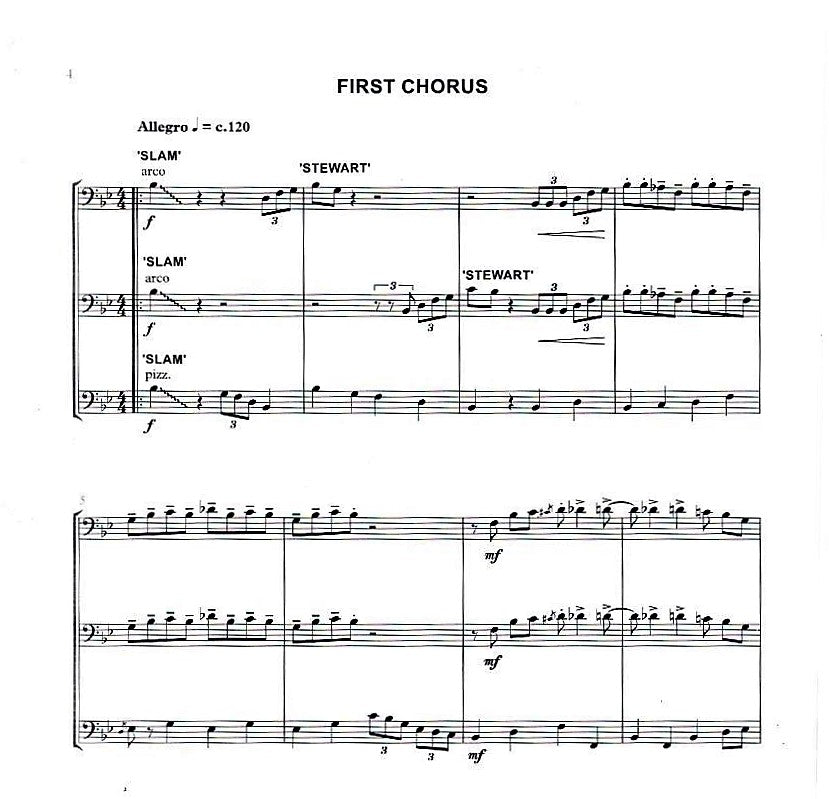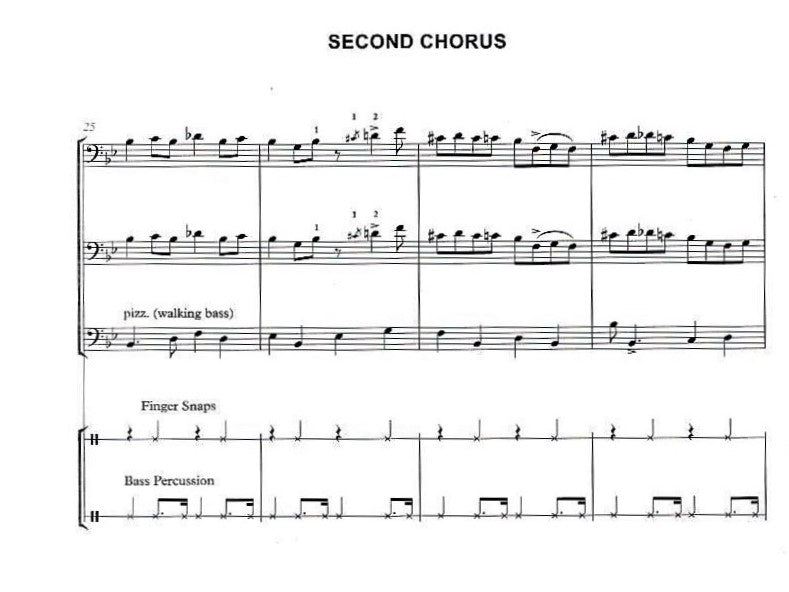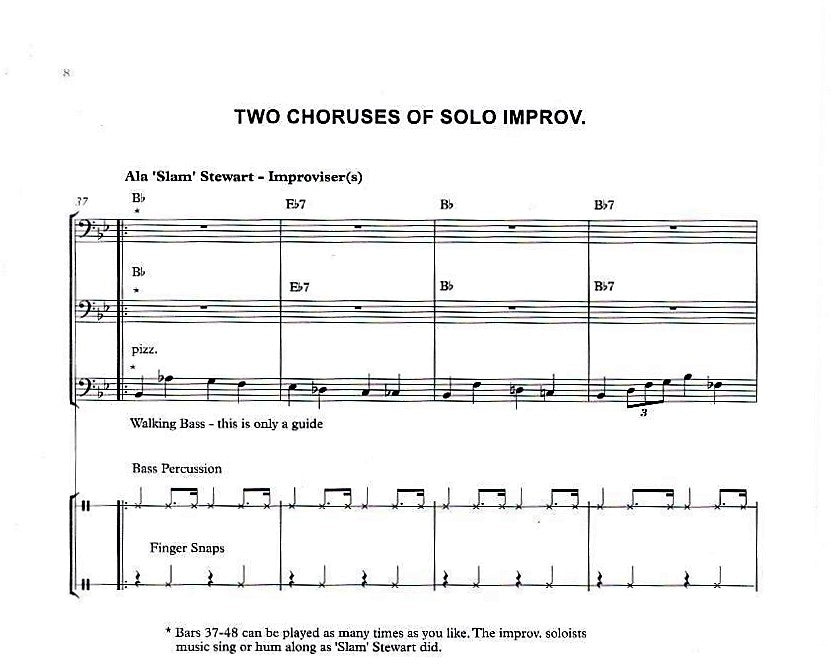David Heyes
Bertram Turetzky: Slam's Jam for double bass ensemble
Bertram Turetzky: Slam's Jam for double bass ensemble
Couldn't load pickup availability
About the Composition
Slam’s Jam was commissioned by the International Society of Bassists (ISB) for their 2009 Young Bassists Programme. It was composed between 2008-9 and is in memory of Leroy 'Slam' Stewart (1914-1987) who was a famous jazz bassist who hummed or sang along as he played.
The piece celebrates this aspect of his playing in a jazz and rhythmic style and offers improvisations and many opportunities for the adventurous ensemble. There are also percussion parts playable by bassists or percussionists and the possibilities are endless.
Slam’s Jam includes five bass parts, two of which are percussion only, and can be played by quintet or larger forces.
About the Composer
Born on 14 February 1933 in Norwich, Connecticut Bertram Turetzky took up the tenor banjo at the age of 12 or 13, he switched to the guitar in high school, having fallen in love with jazz, and then changed to the double bass which he described as '...the core of everything, the glue between the harmony and the wind instruments.'
He subsequently studied at New York University and Hartt College of Music of the University of Hartford and slowly changed direction from jazz to everything else a bassist is asked to do - symphony, opera, contemporary, jazz, teaching and recitals, featuring many of the new works that were being written for him. For many years he combined his hectic performance schedule with teaching, first at the Hartt School of Music and from 1968 as Professor of Music at the University of California, San Diego, where he retired as 'Distinguished Professor Emeritus' only a few years ago.
Alongside his passion for contemporary music, Bert has also played a wealth of music from the 15th and 16th-centuries. He has transcribed works for every possible combination of instruments, but usually including the flute which was always played by his wife Nancy, and the husband and wife partnership have been fearless in their promotion of music for this rare instrumental duo. The vast majority of repertoire for flute and double bass today was either written for Bert and Nancy, or inspired by them. Bert has an interest in any repertoire which features the double bass and has championed many chamber works which are unknown or have been forgotten.
Bert has composed and transcribed many works for double bass. For some years his interest in the music of Domenico Dragonetti (1763-1846) was a passion and in the early 1960s he edited six waltzes for unaccompanied double bass by the great Venetian bassist. Although Bert Turetzky has spent most of his life playing modern music and creating every possible sound and noise that the double bass can produce, his own compositions, on the whole, are far more traditional and accessible. He has composed a whole range of music for double bass, probably for his own use or for his students, and into his 80s the desire to compose and perform are as strong as ever. [David Heyes/June 2015]
"Early in his career, while teaching at the Hartt School of Music in Connecticut, Turetzky's life took a change of direction. A friend, a composer, committed suicide at the age of 26. It was thought that the composer despaired because no one would perform his music. This dramatic episode illustrated to Turetzky that modern composers were desperate to have their works performed, and if he wanted to play music on his instrument, he needed to collaborate with them. Along with Henry Larsen, a clarinettist, Turetzky formed the Hartt Chamber Players and sought out the new music of living composers. 'Whatever was written for us, we would play it all. We didn't stick to what was "safe",' he says." [Paul Hormick/Double Bassist, Spring 2003]
This one event completely changed Bert Turetzky's life, but also changed one aspect of the repertoire and direction of the solo double bass for decades to come. Almost single-handedly he persuaded composers to explore every sound, noise and effect possible on the double bass, pushing the boundaries of music/noise to the limit and creating a repertoire which is possibly unique in the history of the instrument. His book 'The Contemporary Contrabass', written in 1974, was described as 'a milestone in the search for new timbres, at the same time futuristic and traditional' and described in great detail the many sounds that were possible on the double bass and was based on much research and exploration in the 1950s and 60s. More than 300 works have been written for him and still at the age of 82 Bert's passion for the double bass is as strong as ever.
Born on 14 February 1933 in Norwich, Connecticut Bertram Turetzky took up the tenor banjo at the age of 12 or 13, he switched to the guitar in high school, having fallen in love with jazz, and then changed to the double bass which he described as '...the core of everything, the glue between the harmony and the wind instruments.' Paul Hormick writes: "...he made a commitment to become a professional jazz bassist. If his playing was not top notch, he had, as he says, 'the energy, commitment, and drive' needed for success. A letter from a classmate, on the occasion of Turetzky's 50th high school reunion says that, of the class, Turetzky 'was the only one who knew what he wanted to do, and went out and did it'."
He subsequently studied at New York University and Hartt College of Music of the University of Hartford and slowly changed direction from jazz to everything else a bassist is asked to do - symphony, opera, contemporary, jazz, teaching and recitals, featuring many of the new works that were being written for him. For many years he combined his hectic performance schedule with teaching, first at the Hartt School of Music and from 1968 as Professor of Music at the University of California, San Diego, where he retired as 'Distinguished Professor Emeritus' only a few years ago.
Alongside his passion for contemporary music, Bert has also played a wealth of music from the 15th and 16th-centuries. He has transcribed works for every possible
combination of instruments, but usually including the flute which was always played by his wife Nancy, and the husband and wife partnership have been fearless in their promotion of music for this rare instrumental duo. The vast majority of repertoire for flute and double bass today was either written for Bert and Nancy, or inspired by them. Bert has an interest in any repertoire which features the double bass and has championed many chamber works which are unknown or have been forgotten.
Bert has composed and transcribed many works for double bass. For some years his interest in the music of Domenico Dragonetti (1763-1846) was a passion and in the early 1960s he edited six waltzes for unaccompanied double bass by the great Venetian bassist. Published by McGinnis & Marx, the pieces had been completely unknown and unavailable at the time and still in manuscript and this one publication and his subsequent recording in 1975 'Dragonetti Lives!' which featured three of the waltzes, a solo for double bass and piano and a Duo for cello and double bass, probably kick-started the resurgence of interest in Dragonetti's music which is taking flight in the 21st-century. Although Bert Turetzky has spent most of his life playing modern music and creating every possible sound and noise that the double bass can produce, his own compositions, on the whole, are far more traditional and accessible. He has composed a whole range of music for double bass, probably for his own use or for his students, and into his 80s the desire to compose and perform are as strong as ever. [David Heyes/June 2015]
